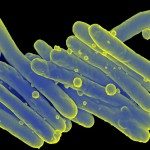Lien vers Pubmed [PMID] – 21646350
J. Biol. Chem. 2011 Jul;286(30):26987-95
Autophagy is an important mechanism of innate immune defense. We have recently shown that autophagy components are recruited with septins, a new and increasingly characterized cytoskeleton component, to intracytosolic Shigella that have started to polymerize actin. On the other hand, intracytosolic Listeria avoids autophagy recognition by expressing ActA, a bacterial effector required for actin polymerization. Here, we exploit Shigella and Listeria as intracytosolic tools to characterize different pathways of selective autophagy. We show that the ubiquitin-binding adaptor proteins p62 and NDP52 target Shigella to an autophagy pathway dependent upon septin and actin. In contrast, p62 or NDP52 targets the Listeria ActA mutant to an autophagy pathway independent of septin or actin. TNF-α, a host cytokine produced upon bacterial infection, stimulates p62-mediated autophagic activity and restricts the survival of Shigella and the Listeria ActA mutant. These data provide a new molecular framework to understand the emerging complexity of autophagy and its ability to achieve specific clearance of intracytosolic bacteria.


